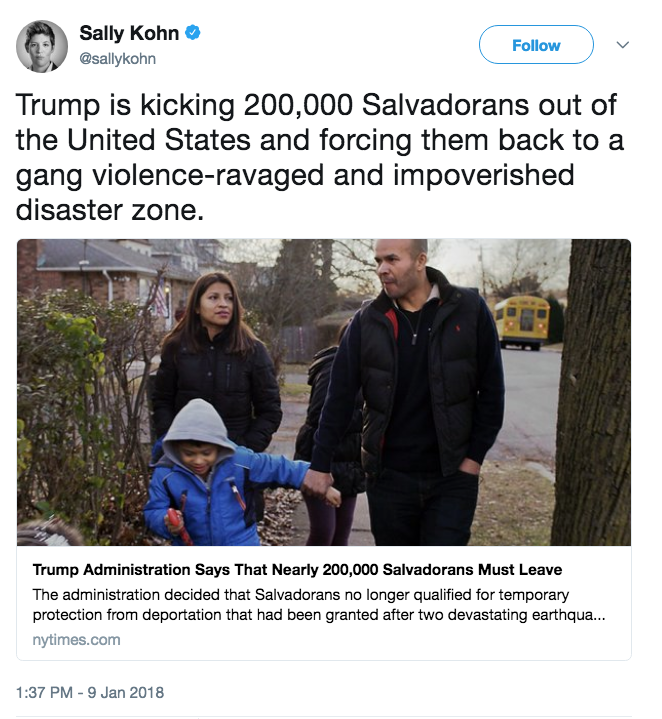
According to Democrats, they want nothing more than to fix the Deferred Action for Childhood Arrivals (DACA) program, which President Donald Trump rescinded in early September due to it being unconstitutional. The registration program was a temporary fix to one of the country’s many significant immigration problems. It supposedly deferred immigration actions against people brought into the country illegally as minors but who have been here for quite some some time.
But it was a bad fix because of how it was done — via executive action instead of the legislature. Courts had already determined similar program for different classes of immigrants to be unconstitutional. According to the U.S. Constitution, presidents are to execute the laws passed by the legislative branch.
When Trump rescinded the program and told Congress to do its job of passing legislation to address the problem, Democrats screamed. President Obama wrote a dramatic Facebook post that didn’t address the little problem that his supposed temporary fix wasn’t a great solution. Months later, there is still no resolution.
Democrats claim to want amnesty for DACA recipients. At least some Republicans claim to want to fix the problems that lead to never-ending streams of non-citizens clamoring for amnesty, such as a porous border and irregular enforcement of the law. The Trump administration and some Republicans seek to end an incoherent immigration policy that is unbound to the needs of the country, particularly the needs of the non-elite portions of the country. All of these competing desires make now seem like a prime opportunity for an immigration compromise.
Early last week, President Trump hosted a cordial negotiation that made the compromise seem possible. But is it true that Democrats are willing to work toward a DACA compromise? They were unwilling to offer any concessions to get it — no wall, no drawdown of random visa lotteries, no de-emphasis on chain migration, no move to a Canadian- or Australian-style merit immigration system. In fact, one of their proposals would actually expand chain migration, by which family members can get an easier path to U.S. residency and citizenship than other applicants.
Also, that refusal to make concessions was before Sen. Dick Durbin blew up negotiations by leaking an out-of-context mean word about countries from which the United States brings in winners of random visa lotteries. If Democrats truly wanted to fix the problem of adults who arrived in the country illegally as minors, they probably would have passed something early in the Obama presidency when they also controlled the House and Senate. They had from 2008 to 2010 to do whatever they pleased.
And if Democrats truly wanted to fix the problems caused by lax borders, border security, and enforcement, they would be on board with each of those measures on the table now. Not fixing holes in the border, whether real or metaphorical, turns the issue into the new debt limit battle, in which fixes are required every few years.
DACA recipients are one of the smallest and easily the most popular group of the massive number of illegal residents of the country. Given that Democrats claim to want to help this popular group, why in the world would they not? Let’s first revisit the narrative of the previous week or so.
Setting A Narrative
Last week Durbin leaked that President Trump used a very mean word disparaging some countries from which the United States accepts many immigrants randomly, as opposed to purposefully. Immediately the Resistance — be they the media, Democratic activists, or ever-impotent members of the Republican establishment — stepped up to wail and freak out. The talking point immediately became that disparaging some third-world countries is obviously racist.
Not to be the dung in the punch bowl, but the context of Trump’s remarks, which ranged from in dispute to absent, is necessary before making such a claim with wild abandon. That’s because if Trump wants merit-based immigration, and he does, it doesn’t matter what type of country one comes from, but what type of candidate the individual applicant is. Under his plan, candidates would be ranked on their education, skills, language, and chance for success, not what type of country they come from.
If Trump was defending his decision to end temporary immigration status for people who were escaping 2001 earthquakes or other problems, it wouldn’t make sense for him to refer to those places as s***holes while also saying they have to go back. In fact, people who oppose returning El Salvadoreans say we can’t do it precisely because, well, it’s not a nice place to go back to. Here’s Sally Kohn, for instance:

Presumably, then, he was arguing against random visa lotteries that privilege certain countries or against the overuse of chain migration, at the expense of an immigration policy that meets the needs of current U.S. citizens, particularly those who are not economically privileged. But that’s a difficult thing to discuss. It’s easier for our elites in both parties and the media to grandstand and pose than to worry about the long-term economic, security, legal, and national sovereignty effects of a thoughtless immigration system.
The media weren’t interested in understanding the context of the remarks, just pushing the narrative that if you disparage certain countries you are obviously racist and all virtuous and well-meaning people in politics are disgusted by it. It was almost tailor-made for the completely hysterical Resistance of 2018. It allows people to cast Trump as a racist villain while simultaneously casting themselves as the virtuous heros standing up for the poor huddled masses.
It also enables people to blame Trump for the lack of a deal. Here’s The New York Times, for instance:
WASHINGTON — President Trump’s incendiary words about immigration have dampened the prospects that a broad spending and immigration deal can be reached by the end of the week, raising the possibility of a government shutdown with unknown political consequences for lawmakers in both parties.
It’s an interesting story, but it neglects the obvious point that the out-of-context leak was designed to dampen the prospects of an immigration compromise. You may want to sit down for this, but sometimes people care more about profiting from a problem than solving a problem. What if Democrats are using DACA recipients as human shields for their own electoral plans in November, and to get increased voter intensity, higher political donations, and greater turnout in upcoming elections?
It’s the Left’s Obamacare Repeal
Democrats could reasonably say they learned this from Republicans, who long claimed they wanted to help people burdened by Obamacare.
Republicans said all they wanted to do was repeal Obamacare but couldn’t do it because they had no power. So voters gave them the House, at which point they said they needed the Senate, too. Republicans took control of the Senate, then said they couldn’t repeal Obamacare with just Congress, they needed the White House as well. Now they have all these things and still have not repealed Obamacare. But they do have the audacity to tell voters that what they really need is a stronger majority in the Senate.
One might be forgiven for surmising they care less about repealing Obamacare than they care about power.
Risky But High-Reward Strategy
In that New York Times story above, Sen. Claire McCaskill has some interesting quotes. Here’s one:
‘Welcome to our world,’ said Senator Claire McCaskill, Democrat of Missouri, who is running for re-election in a state that Mr. Trump carried by 19 percentage points.
‘We’ve got people running for president all trying to find their base, and then you’ve got people from Trump states that are trying to continue to legislate the way we always have — by negotiation,’ Ms. McCaskill said. “And never the twain shall meet.’
The article identifies senators Kamala Harris of California, Cory Booker of New Jersey, and Kirsten Gillibrand of New York as Democratic presidential contenders willing to shut down government to show their commitment to DACA. Meanwhile, ten of the Democratic senators up for re-election are in situations like McCaskill’s, where shutting down the government over DACA might not be viewed as favorably as it is in the salons and media establishments of DC and New York.
Still, it’s a strategy with some sense. The last thing Democrats want is for Trump to solve any of the problems he was elected to address. The 2017 elections in Virginia and Alabama are Democrats’ blueprint for 2018, which is to increase Democratic voter intensity while capitalizing on Republican malaise. This is a recipe for a Democratic tidal wive.
What better way to use your party’s identity politics toolbox to increase rage and anger among important minority demographics than to get people spun up about Trump calling ancestral countries s—holes?
What Should Republicans Do?
Here’s what Republicans shouldn’t do: fall for every media distraction designed to keep the conversation away from fixing immigration problems. The s—show was a huge success for the Resistance, granted. That so many people who are ostensibly supposed to advance conservative policies and achieve conservative victories fell for the spin is bad news for Republicans.
Republicans should get wise and stop acting naive. The New York Times story acknowledges that Democrats would be responsible for any government shutdown due to their recalcitrance on DACA concessions. But in the same story Sen. Lindsay Graham impotently says that Republicans would be blamed for any shutdown. Indeed, they would be, particularly when their supposed leaders don’t know enough about how to play politics and stay on message about priorities and responsibility.







